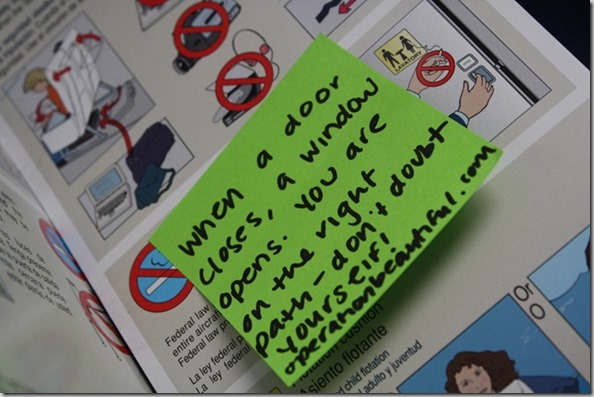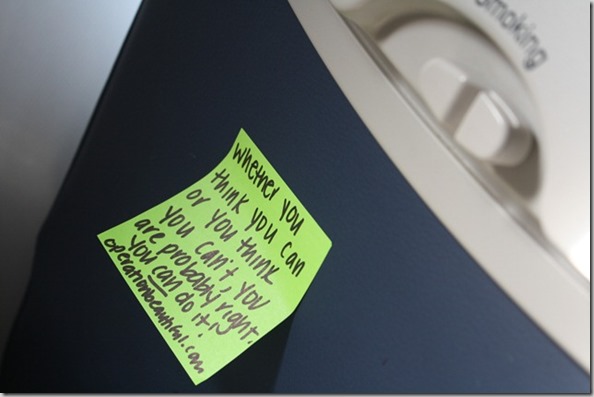I’ve been thinking a lot about personal narratives – the stories that you tell yourself about your life. We all craft a narrative every single day, and our narrative can be positive or negative (or a bit of both). Maybe your narrative currently includes thoughts like: “I hate my job,†“I love my family,†“I need to lose weight,†“I live in the best city in the world!†or “I am so tired of being broke.â€Â These thoughts flit casually through our minds or are mantras that we brood on and obsess over.
One of the aspects of personal narratives that I find interesting is how our thoughts can compound and grow into something bigger – both in a good way and a bad way. I think a lot of us are aware of how one stress-induced moment can explode into something much, much larger. An event that triggers a “God, I hate my boss!†narrative can quickly snowball… You think the nasty thought every day for a week, and then you start gossiping about your boss with your coworkers, which only reinforces all those negative feelings. Every time you interact with your boss, that narrative comes roaring back – even if your boss is being nice! It’s so hard to let go of some narratives. Before you know it, your entire job is poisoned. You don’t just hate your boss – you hate your job, you hate your benefits, you hate everything about your office.
But positive narratives can have a similar impact. I’ve found that so much of life is choosing to be happy. Choosing to be content. Choosing to look on the bright side. Choosing to have a positive narrative can turn a stressful situation into a lighter one. I think many of us overlook the power of CHOOSING a positive personal narrative. Because just like negative thoughts, positive ones can snowball, too. A positive narrative impacts everything you do and everyone you interact it. A positive narrative cannot change your circumstances, but it can make everything more enjoyable and easier.
Here’s the difficulty in choosing a positive narrative: there is a lot of negativity in the world. A ton of toxicity. It’s everywhere, and because it’s constantly being spewed at you from all angles (with frenemies, with family, on reality TV, in magazines, online), it seems so PERVASIVE. So in-your-face. Don’t get me wrong – the positivity is there, too. And there’s a lot of it – if you look for it. But it never seems as loud or as urgent as the negative narratives. The negative narratives can even be kind of fun – especially if you’re harping on someone else. The positive ones sometimes feel… quaint. Or naive. Or just silly.
One of the things that I realized while pregnant was how important it was for me to eliminate all forms on negative talk about parenting. And there is a LOT of negativity about parenting out there, both in real life and online. Now – don’t get me wrong. I understand venting (I do it), and I appreciate the need to be honest about parenting struggles (I do that, too). One of the worst things our society does to mothers (and women in general) is make us feel like we can’t express anxiety, sadness, disappointment, or unhappiness in any way, shape, or form. Expressing true emotions is not necessarily being negative. In fact, it can be incredibly positive, both for the person speaking the truth and for the person who hears it and feels like, “I’m not alone!â€Â So many voices in our society say that we’re NOT allowed to express our difficult emotions – because if we do, we’re bad moms who don’t love our kids. That’s silliness. Difficult emotions are human, and difficult emotions can be part of a positive narrative.
So I think it’s important to make the distinction that positive narratives don’t always whitewash the hardships of a situation. It’s not that at all. I think of positive narratives as, yes, being optimistic, kind, forgiving, and hopeful, but also being vulnerable and honest. I don’t think it’s damaging to your personal narrative to think, “Man, I am really struggling here.â€Â But how you’ll feel about the situation depends heavily on whether you conclude that thought with “…But I can face my fears and do this†or “…Hell, this sucks, I’m going to pour myself another giant glass of wine and brood on it some more.†The negative narratives are hurtful. Mean. Snarky. Toxic. Maybe there are some things that I would consider negative that you wouldn’t and vice versa, but in general, I think it’s pretty clear what type of talk falls in each category.
Other mommas have probably encountered the snarky mommy narrative. You know what I’m talking about – blog posts about how pointless and stupid kids’ birthday parties are or memes about how children ruin your life. Motherhood sometimes feels like it’s something to be laughed at or trudged through or survived. The narrative is so, so mean – it’s a form of honesty, sure, but it’s nasty, too. And I wonder about the impact of this negative narrative on our collective attitude about parenting. Even if you have GREAT kids, if you see meme after meme about what a drain children are on your good-time life, do you slowly start to integrate that thought into your own narrative? Honestly – I think you do. There’s a point where it stops being something to just giggle at as you scroll through your Facebook feed. If you keep exposing your mind to those messages, a little nibble of it sinks in.
I think this concept applies to many aspects of life: work, relationships, health, family. What thoughts do you have about your life? Where did these thoughts come from? How are they influenced by others – in good ways or bad?
Some suggestions for developing a more positive narrative… (These are things that I continue to work on within myself every. single. day.  I’ve noticed that the more I actively work towards these principles, the happier I am. I don’t think the goal is to be ‘perfect’ in your positive thinking, but I try to put more eggs in my positive basket than my negative one.)
Identify Sources of Negativity: I challenge you to consider how the people that you speak to, the articles that you read, the music you listen to, and the forums that you participate in influence your narrative about your life. The connections between your negative narrative and negative sources of information may be direct – you’re struggling with parenting and are reading too many snarky mommy sites, which only reinforce your outlook. But don’t forget that negativity brews negativity regardless of the source or topic. Maybe you’re feeling really down-in-the-dumps about your body. You’ve got a friend who is always complaining about not having enough money, status, material possessions. Even though the two topics aren’t related, her attitude can impact yours.
I had a friend who recently went through a really hard breakup. The woman was gone, but he was still really unhappy because her negativity had permeated everything about his life. He declared that he was going to eliminate all sources of negativity. He cut out everyone who treated him (or others) poorly. He stopped reading depressing news articles. He began to go to a more positive-focused church. Cutting out the toxicity was the best thing he ever did – he was so much happier as a result. He was still single, but he was exponentially happier – and then, when the right woman DID come around, he was open and ready for her.
So – consider unsubscribing from that magazine, turning off that reality TV show, logging out of that forum, or cutting off a relationship. If you want a more positive narrative, the first step is removing negative ones, even if they feel unrelated.
Seek Out Sources of Positivity: Replace the negative narratives with positives. To me, this is the ultimate “fake it until you make it.†If you’re struggling with parenting, find positive but honest – not picture-perfect – moms to hang out with. If you’re grappling with body image issues, fill your Facebook feed with positive messages. If you’re struggling with finances, grab the bull by the horns and enroll in a budgeting course. You get the idea – surround yourself with positivity, and you will become a bit more positive. It’s really is that simple. And when you are more positive, you can be that beacon of honesty positivity for others, which is so powerful!
Yes, it is a little quaint. And yes, you may feel a little jaded about all the sunshine, kittens, and roses. But just like negativity brews negativity, positivity brews positivity. If you want to truly have a more positive narrative, you’ve got to begin by opening yourself up to outside sources of positivity.
Challenge Your Negative Thoughts: When you do find yourself engaging in your negative narrative, you’ve got to turn that thought around. Through Operation Beautiful, I’ve interviewed hundreds of teens and women, and the one thing that people consistently agree on in regards to positive thinking is this: you have to replace your negative thought with something positive BUT realistic. You can’t simply tell yourself that you’re a supermodel when you feel like the least attractive woman in the world – it will fall on deaf ears. You can’t tell yourself that you absolutely adore every aspect of parenting when your toddler is having a meltdown and you haven’t had time to brush your teeth – you’ll laugh yourself silly! But you can reframe your negative narrative with something like: “My legs have cellulite on them, but they are also strong and capable†or “All mothers need a break every now and then – it’s normal that I feel frustrated in this moment. This feeling won’t last.â€Â And – for goodness sake – if you need it, get yourself to therapy! It can be an amazing process for deeply integrating these suggestions into your life.
Have an amazing day. <3





Amazing post! So well-written. I especially like “our thoughts can compound and grow into something bigger”- just hits the nail on the head.